
Veganism is no longer a fringe movement. With growing awareness of animal rights and environmental concerns, it's increasingly common to see young people embracing a plant-based lifestyle. However, a recent anonymously penned article, "I coaxed my vegan grandchildren into eating sausages and chicken - is that so wrong?" exposes a troubling trend: the pressure placed on vegan children to conform to traditional diets.
Quote from the referenced article: ‘‘…She knew I’d support her choice, and she went on to confess that she’s been quietly introducing animal products to her diet, including pizza with cheese. Thankfully, Nicky appreciates that Molly’s at an age where she’s spending more time with her friends at weekends, and that this makes it harder for her to be vegan when they’re tucking into ice-cream and fried chicken….’’
This editorial urges families to respect children's dietary choices, regardless of whether they align with personal beliefs.
Veganism is more than just a dietary restriction; it's an ethical stance. It reflects a commitment to minimizing harm to animals and promoting compassion. Many children choose veganism alongside their parents, aligning themselves with these values. Coercing these children into eating meat disrespects their developing ethical compass and creates a confusing dissonance. Imagine being forced to act against your core beliefs – it wouldn't be conducive to healthy child development. Respecting their choices and fostering a supportive environment where these choices are affirmed is key.
Concerns about the health of vegan children are often raised. However, with proper planning, a well-balanced vegan diet can be incredibly healthy for children of all ages. The Academy of Nutrition and Dietetics stands by this, and registered dietitians can help parents ensure their children receive all necessary nutrients through a varied plant-based diet. Conversely, processed meats like sausages, often touted as "normal" food, carry significant health risks.
The psychological impact of coercion on children can't be ignored. Guilt, betrayal, and confusion about their dietary choices are just some potential consequences. Children who feel their ethical stances are disregarded may struggle with self-esteem and trust. Let's encourage autonomy and respect for their choices. Positive reinforcement and education about the variety and deliciousness of healthy vegan options are far more effective alternatives.
Of course, societal norms and cultural traditions can sometimes clash with veganism. However, families and communities must strive for inclusivity and respect for diverse lifestyles and dietary choices. Grandparents and other family members can play a positive role by supporting younger generations' ethical and dietary choices. Learning about vegan cuisine and exploring plant-based recipes together can be a fun and bonding experience, fostering acceptance and understanding.
The bottom line is that parents can raise their children according to their beliefs, including dietary choices. However, this right shouldn't come at the expense of the child's autonomy. Open dialogue and mutual respect are key to resolving family disagreements about diet and lifestyle. Parents can learn about the benefits of a well-balanced vegan diet and discuss their own concerns with a registered dietitian.
Let's move beyond outdated notions of what constitutes a "normal" diet. Respecting vegan children's ethical choices and supporting their journey is vital. Understanding the ethical principles, health considerations, psychological impact, societal context, and legal aspects of this issue is key. As families navigate dietary differences, let's strive for greater understanding and acceptance of veganism. This fosters a more inclusive environment where everyone feels respected and supported in their dietary choices. It's time we allow our children to be vegan, if that's the path they choose.
Visit Our Amazon Store!
Notice: As an Amazon Associate, we earn a commission from qualifying purchases that help promote animal rights worldwide!
The Vegan Dispatch is a reader-supported publication. To receive new posts and support my work, consider becoming a free or paid subscriber.
Subscribed
General Resources
Books:
Dominion: The Power of Animals in Nature and in Our Imagination by Matthew Scully
Animal Liberation by Peter Singer
Eating Animals by Jonathan Safran Foer
A Billion Hungry Mouths: Feeding the World Without Consuming the Planet by Colin Tudge
Websites and organizations:
Documentaries:
Articles:
"The Case for Animal Rights" by Tom Regan
‘‘Why We Love Dogs, Eat Pigs, and Wear Cows: An Introduction to Carnism’’ by Melanie Joy
‘‘Animal Rights: The Abolitionist Approach’’ by Gary L. Francione
‘‘Fellow Creatures: Our Obligations to the Other Animals’’ by Christine Korsgaard
Seeds of Compassion: Finding Jesus Christ in a Vegan World by Michael Corthell
Receive a single informative article daily at 12:01 AM by email. Explore my homepage with exciting vegan and plant-based news content and delightful and delicious recipes for additional updates. Stay connected to the vegan world and all it has to offer.
Visit The Vegan Project Global our Facebook page for more vegan outreach and education.
The information on this vegan/plant-based blog is for general informational purposes only. It is not intended as legal, medical, or professional advice. Readers should consult with appropriate professionals for specific advice tailored to their situation. The blog owner is not responsible for any reliance on the information herein.




